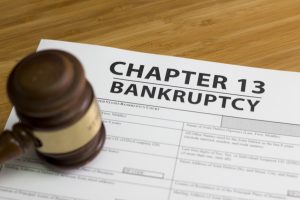 Helping NJ Clients Navigate Chapter 13 Bankruptcy
Helping NJ Clients Navigate Chapter 13 Bankruptcy
Sometimes life does not go as planned and you find yourself in a difficult financial situation with debt collectors calling every day. Filing for Chapter 13 bankruptcy may be your solution. This course of action gives you the chance to pay only what you can afford, allowing you to keep your property, stop the harassment, and stabilize your finances.
What is Chapter 13 and How Can a Bankruptcy Attorney Near Me Help?
If you’re seeking debt help, this form of bankruptcy allows the court to work with you to restructure your debt and pay your monthly obligations without going deeper and deeper into the hole. According to federal guidelines, you are eligible to file Chapter 13 bankruptcy if you have unsecured debts less than $383,175 and/or secured debts less than $1,149,525.
We can help you determine what solution is right for your financial situation, including the following.
Secured debts and Chapter 13 bankruptcy
Secured debt means if you don’t pay the loan, the creditor has the right to repossess the asset that was the basis for the loan. Mortgages and car loans are the most common types of secured debt. When you buy a home, you get the house. You agree to pay the purchase price on a monthly basis. You also agree (through a mortgage) that if you don’t make the payments, the creditor can take your house. With a car, you agree to make the monthly payments. If you default, the car can be repossessed. Debtors who contemplate Chapter 13 are usually behind on their mortgages and car loans. This form of bankruptcy lets you pay the amount you’re behind (the arrears) over a 3 to 5-year period, as long as you continue to make the monthly payments going forward.
Unsecured debts and Chapter 13 bankruptcy
Your credit cards, medical bills, and even your personal taxes may qualify as unsecured debt. In this case, there’s no personal property to back up the loan. When filing Chapter 13, you will propose to pay a small percentage of the unsecured debt over a 3 to 5-year period. If you have money left over, it is used to pay the unsecured debt. You will also be able to restructure existing debts such as your mortgage, allowing you to meet these obligations going forward and begin to rebuild credit right away. It is possible for you to keep your home and car under Chapter 13 bankruptcy protection. Once you successfully follow through on the terms of your repayment plan for a period of time, usually between three and five years, any remaining unsecured debt can be discharged by the court. When you get to that point, you will no longer be legally obligated to pay the unsecured debt.
Chapter 13 Meeting of Creditors
You will have to attend a meeting, also known as a 341(a), involving the bankruptcy trustee, you, your lawyer, and any creditors who wish to attend. During this meeting, the group will discuss your financial situation and the most practical way to satisfy the secured and unsecured debts you owe. The parties will discuss the repayment plan you have brought to the table and, of course, their plan. After the meeting of creditors, the court will decide on the debt help plan that best suits the situation within 45 days, and payment through the restructured debt payment plan will start soon after.
Contact Our NJ Chapter 13 Bankruptcy Law Firm
Filing for Chapter 13 is a complicated and document-heavy process. You need the legal support of an experienced law firm to guide you and protect your rights and future. If you searched for a “bankruptcy attorney near me,” you have found a true partner for the protection of your financial future.
Contact Tomes Law Firm, PC for a free consultation today, and we’ll help you weigh your options.
